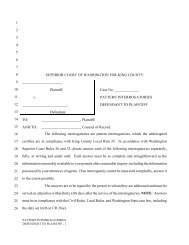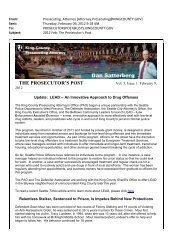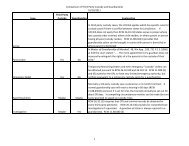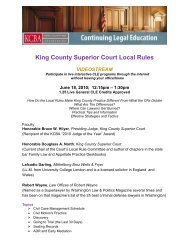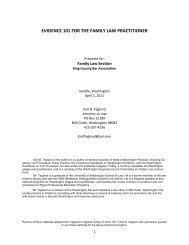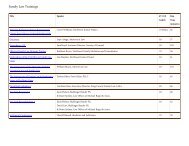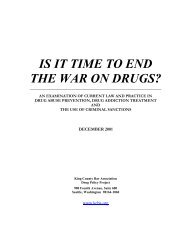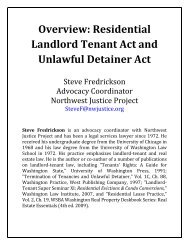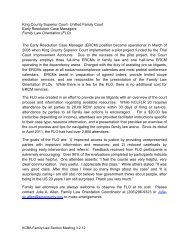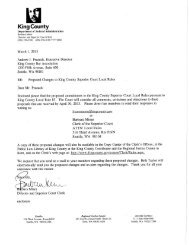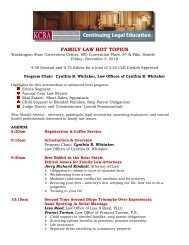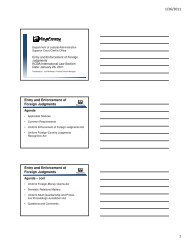Effective Drug Control: Toward A New Legal Framework
Effective Drug Control: Toward A New Legal Framework
Effective Drug Control: Toward A New Legal Framework
Create successful ePaper yourself
Turn your PDF publications into a flip-book with our unique Google optimized e-Paper software.
targeting patent medicine-makers with regulation, all for the sake of “purification” and to<br />
“protect the children.” 94<br />
The Pure Food and <strong>Drug</strong> Act marked a significant change in the conception of the<br />
constitutional power of the federal government. Matters of public health and safety were<br />
long considered the exclusive realm of the states and the federal government had no<br />
ability to exercise a general police power. This was especially true in an area that<br />
affected business interests, so Congress had to be creative in the drafting the Pure Food<br />
and <strong>Drug</strong> Act as a criminal statute, ultimately relying on the Commerce Clause for its<br />
authority. 95<br />
Although the Pure Food and <strong>Drug</strong> Act did not impose any prohibitions, it had a<br />
historically demonstrable effect on reducing opiate addiction. 96 <strong>New</strong> purity and labeling<br />
requirements markedly improved the safety of medicines and drugs available to the<br />
public. This record of success was interrupted, however, by the passage of the Harrison<br />
Narcotic Act of 1914, which essentially cut off access to the legal, well-regulated supply<br />
of opiates and enabled the growth of an illicit market in adulterated, misbranded and<br />
contaminated drugs of all kinds. 97<br />
The national “anti-drug” movement in the United States was only in its infancy at<br />
the time of the Pure Food and <strong>Drug</strong> Act, whereas alcohol had been the primary target of<br />
moral and social crusaders for quite some time. The Anti-Saloon League and the<br />
influential alcohol prohibition movement had overshadowed “anti-drug” forces, which<br />
lacked any strong central organization. It is peculiar, therefore, that the nation’s first<br />
major “anti-drug” law, the Harrison Narcotics Act of 1914, was adopted a full five years<br />
before National Alcohol Prohibition. 98 This historical anomaly stems directly from the<br />
efforts of a few charismatic, driven and influential individuals and from America’s<br />
changing role in world politics at the dawn of the 20 th century.<br />
Opium and U.S. Occupation of the Philippines<br />
Victory in the Spanish-American War in 1899 turned the United States into a<br />
world power, which acquired Puerto Rico, Guam, Cuba and the Philippines, embracing<br />
its moral duty to uplift the inferior peoples in these territories. 99 The Filipinos were less<br />
enthusiastic about U.S. domination, however, and they rose up against the American<br />
occupiers in a prolonged insurrection. Upon suppressing this uprising, the United States<br />
took over governance of the Philippines and William Howard Taft was appointed civil<br />
governor. One of the first major problems he had to face was how to deal with island’s<br />
“opium problem.”<br />
Opium use in the Philippines was very common and the Spanish had previously<br />
operated an opium monopoly on the islands that entailed licensing narcotics addicts and<br />
legally supplying them with their requirements of the drug. 100 Despite Governor Taft’s<br />
support for continuing this practice, the notion was extremely offensive to two influential<br />
American religious leaders in the Philippines, Reverend Wilbur Crafts, a Roosevelt<br />
administration official and leader of the International Reform Bureau, and the Reverend<br />
Charles H. Brent, the Episcopal Bishop of the Philippines. Both of these men strongly<br />
opposed, on moral grounds, American involvement in supporting such a vice as opium



